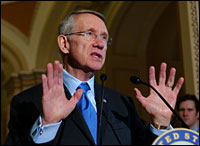
Republican leaders essentially shut down the Senate Wednesday during what was supposed to be a time of debate on the Lieberman-Warner Climate Security Act, forcing clerks to read the entire 492-page bill aloud. Republicans said the maneuver — which sucked up nine hours — was a protest against the Democratic majority’s slow pace in considering President Bush’s judicial nominations.
By the time the reading wrapped up near 10 p.m. last night, Majority Leader Harry Reid (D-Nev.) was livid. “[Climate change] is the most critical issue of our time,” said Reid. “The American people have a right to have their Congress address this issue.”

Reid read from what he described as a leaked strategy email [PDF] from a GOP lobbyist, which urged the party’s senators to stall productive debate as long as possible in hopes of scoring “political points” against the Democrats.
“The goal is for a theme — example, climate equals higher gas prices — each day,” Reid read from the memo, “and the focus is much more on making political points than in amending the bill, changing the baseline text for any future debate, or affecting policy.”
“This Republican strategy memo couldn’t be more clear: The Republican plan in dealing with the greatest challenge facing this world and this nation is more about making political points than legislating,” said Reid. “You couldn’t make up anything more cynical.”
Reid had said he’d like to have debate over the Climate Security Act wrapped up by the end of next week, but Republican leaders last night pledged to keep dragging it out. “It is not a one-week bill,” said Minority Leader Mitch McConnell (R-Ky.). “This is at least a one-month bill.”
Sen. Jeff Sessions (R-Ala.), who earlier in the day had referred to Reid as “clueless,” chimed in as well. “This is not an itty-bitty issue,” he said.
So Reid said he would call for a cloture vote to end debate on the bill on Thursday or Friday, without substantive debate of amendments. It was a protest move, an effort to maintain authority over the bill and prevent further time-wasting on the part of the Republican leadership.
“The Republicans are trying to maintain the status quo in everything,” said Reid, who appeared tired and frustrated as the scuffling dragged on past midnight. “They don’t want legislation and they’ve proven that today time and time again.”
In all likelihood, the cloture vote will mean death for the most serious climate bill ever taken up by the full Senate. The partisan high jinks of the last two days indicate that the vote will likely fall largely along party lines. And with no substantive debate of amendments, there’s little chance the bill will get even close to the 60 votes needed to move forward.
Though the bill’s sponsors and green groups had hoped to see more productive debate on the bill this year, events so far have at least provided a starting point for climate legislation next year — and a clear villain to blame for its failure this year.
“If the Senate should fail to act on this bill, it is abundantly clear that the Republican leadership alone will be to blame,” said Sierra Club Executive Director Carl Pope in a written statement last night. “While the Senate leadership has proposed real relief for consumers suffering from skyrocketing energy costs, unfortunately Senate Republicans have nothing to offer but reading and roadblocks.”


